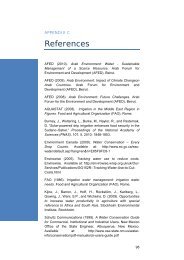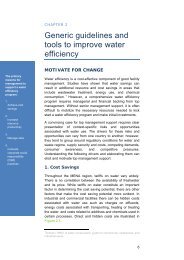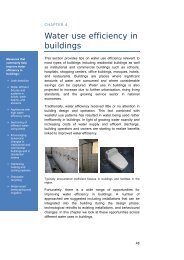Impact of Climate Change on Arab Countries - (IPCC) - Working ...
Impact of Climate Change on Arab Countries - (IPCC) - Working ...
Impact of Climate Change on Arab Countries - (IPCC) - Working ...
You also want an ePaper? Increase the reach of your titles
YUMPU automatically turns print PDFs into web optimized ePapers that Google loves.
ARAB ENVIRONMENT: CLIMATE CHANGE 131<br />
bility for acti<strong>on</strong> <strong>on</strong> climate change falls <strong>on</strong> the<br />
shoulders <str<strong>on</strong>g>of</str<strong>on</strong>g> the industrialized countries, which<br />
with <strong>on</strong>ly 20% <str<strong>on</strong>g>of</str<strong>on</strong>g> the world’s populati<strong>on</strong>, have<br />
c<strong>on</strong>tributed about 75% <str<strong>on</strong>g>of</str<strong>on</strong>g> total CO 2 emissi<strong>on</strong>s.<br />
As we now know, very few countries adopted the<br />
necessary policies and measures called for by the<br />
c<strong>on</strong>venti<strong>on</strong> and greenhouse gas emissi<strong>on</strong>s c<strong>on</strong>tinue<br />
to increase. Because energy c<strong>on</strong>sumpti<strong>on</strong> is so<br />
vital to industrialized countries, the barriers, both<br />
ec<strong>on</strong>omic and political, to adopting the necessary<br />
policies and measures have been very high.<br />
With implementati<strong>on</strong> <str<strong>on</strong>g>of</str<strong>on</strong>g> voluntary measures faltering,<br />
the first C<strong>on</strong>ference <str<strong>on</strong>g>of</str<strong>on</strong>g> the Parties to the<br />
C<strong>on</strong>venti<strong>on</strong> in Berlin agreed to negotiate a<br />
Protocol to define more precisely the emissi<strong>on</strong>s<br />
reducti<strong>on</strong> commitments <str<strong>on</strong>g>of</str<strong>on</strong>g> developed countries.<br />
It took two years to negotiate the Kyoto Protocol<br />
(1995-97) and another 8 years for it to come into<br />
force, when countries representing 55% <str<strong>on</strong>g>of</str<strong>on</strong>g> the<br />
developed country emissi<strong>on</strong>s had ratified. The<br />
US declared its intenti<strong>on</strong> not to ratify the<br />
Protocol in 2001. The Kyoto Protocol set an initial<br />
target and a time table for reducing emissi<strong>on</strong>s<br />
by industrialized countries. Industrialized countries<br />
were to reduce greenhouse gas emissi<strong>on</strong>s by<br />
5.2% below 1990 levels during the first commitment<br />
period <str<strong>on</strong>g>of</str<strong>on</strong>g> 2008-2012. For the U.S. it was<br />
a commitment <str<strong>on</strong>g>of</str<strong>on</strong>g> 7%.<br />
While the Kyoto Protocol was intended as a first<br />
step in implementing the climate change c<strong>on</strong>venti<strong>on</strong>,<br />
it would not have materially altered the<br />
l<strong>on</strong>g-term atmospheric c<strong>on</strong>centrati<strong>on</strong>s <str<strong>on</strong>g>of</str<strong>on</strong>g> greenhouse<br />
gases. And for the U.S., emissi<strong>on</strong>s in 1997<br />
were already 12% above 1990 levels.<br />
Accordingly, the reducti<strong>on</strong>s by the U.S. would<br />
have amounted to almost 20%.<br />
As was expected, the chances <str<strong>on</strong>g>of</str<strong>on</strong>g> the U.S. ratifying<br />
the Kyoto Protocol became zero. What was not<br />
expected, however, was the Bush<br />
Administrati<strong>on</strong>’s outright rejecti<strong>on</strong> <str<strong>on</strong>g>of</str<strong>on</strong>g> the Kyoto<br />
Protocol and the global c<strong>on</strong>cern over climate<br />
change. Rejecting Kyoto’s provisi<strong>on</strong>s as they<br />
apply to the U.S. and proposing viable alternatives<br />
is <strong>on</strong>e thing, taking several steps backward<br />
and arguing that we do not know enough to take<br />
acti<strong>on</strong> is another. The Administrati<strong>on</strong>’s positi<strong>on</strong><br />
was taken in spite <str<strong>on</strong>g>of</str<strong>on</strong>g> the <strong>IPCC</strong>’s 2001 assessment<br />
report, which c<strong>on</strong>cluded that: ‘there is new and<br />
str<strong>on</strong>ger evidence that most <str<strong>on</strong>g>of</str<strong>on</strong>g> the warming<br />
observed over the last 50 years is attributable to<br />
human activities,’ and the US Nati<strong>on</strong>al Academy<br />
<str<strong>on</strong>g>of</str<strong>on</strong>g> Sciences report in the same year saying that<br />
“Greenhouse gases are accumulating in the<br />
Earth’s atmosphere as a result <str<strong>on</strong>g>of</str<strong>on</strong>g> human activities,<br />
causing surface temperatures to rise. There<br />
is general agreement that the observed warming<br />
is real and particularly str<strong>on</strong>g within the past 20<br />
years”.<br />
III. POLICY-MAKING<br />
AND UNCERTAINTY<br />
Much complexity and uncertainty surround climate<br />
change. Despite significant gains in the scientific<br />
understanding <str<strong>on</strong>g>of</str<strong>on</strong>g> climate change, uncertainties<br />
remain. <str<strong>on</strong>g>Climate</str<strong>on</strong>g> models are not usually<br />
designed to tell us anything about the evoluti<strong>on</strong><br />
<str<strong>on</strong>g>of</str<strong>on</strong>g> the climate system in the short-term; rather,<br />
they are designed to simulate l<strong>on</strong>g-term (20-30<br />
years) behaviour as accurately as possible. Also,<br />
while climate models can make reliable projecti<strong>on</strong>s<br />
about change in global climate, their projecti<strong>on</strong>s<br />
about change in regi<strong>on</strong>al climate are less<br />
reliable.<br />
The key questi<strong>on</strong>, however, is no l<strong>on</strong>ger whether<br />
climate change is already happening and should<br />
be a central global c<strong>on</strong>cern. The key questi<strong>on</strong> is<br />
how climate change will manifest itself regi<strong>on</strong>ally<br />
and locally and what can be d<strong>on</strong>e about it. As<br />
governments prepare to meet the challenge <str<strong>on</strong>g>of</str<strong>on</strong>g> climate<br />
change they need to address the trade<str<strong>on</strong>g>of</str<strong>on</strong>g>fs<br />
between near-term ec<strong>on</strong>omic development and<br />
l<strong>on</strong>g-term sustainable development. They also<br />
need to devise effective strategies for dealing with<br />
climate change in the absence <str<strong>on</strong>g>of</str<strong>on</strong>g> full knowledge<br />
<str<strong>on</strong>g>of</str<strong>on</strong>g> regi<strong>on</strong>al impacts and the unsettling prospect <str<strong>on</strong>g>of</str<strong>on</strong>g><br />
reaching irreversibility or tipping points <str<strong>on</strong>g>of</str<strong>on</strong>g> no<br />
return. The uncertainty associated with climate<br />
change projecti<strong>on</strong>s is <str<strong>on</strong>g>of</str<strong>on</strong>g>ten cited as the reas<strong>on</strong> for<br />
people’s failure to accept the need to adapt to climate<br />
change. In the face <str<strong>on</strong>g>of</str<strong>on</strong>g> urgent short-term<br />
priorities such as hunger, poverty and disease,<br />
poor countries and communities find it particularly<br />
challenging to focus <strong>on</strong> adaptati<strong>on</strong> measures<br />
when the predicti<strong>on</strong>s <str<strong>on</strong>g>of</str<strong>on</strong>g> impacts from climate<br />
change are not unequivocal. Uncertainty should<br />
not, however, be an excuse for inacti<strong>on</strong>.<br />
Decisi<strong>on</strong>s are regularly made in the face <str<strong>on</strong>g>of</str<strong>on</strong>g> uncertainty<br />
(e.g., investment decisi<strong>on</strong>s). Water-
















